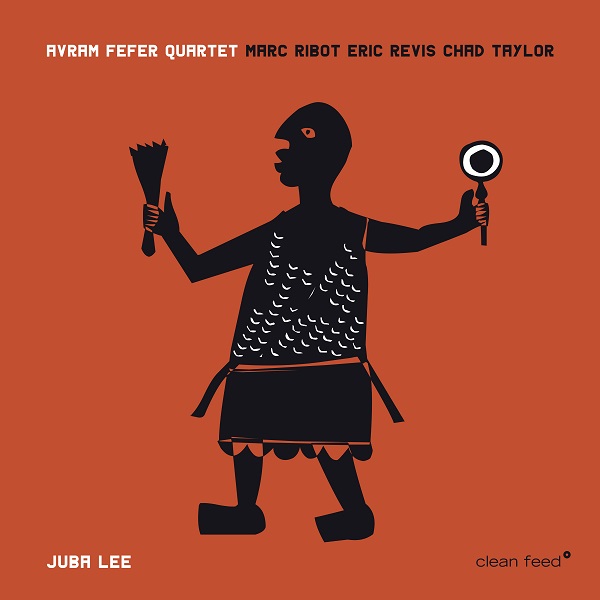
Avram Fefer Quartet
Avram Fefer alto and tenor saxophones, bass clarinet | Marc Ribot guitar | Eric Revis bass | Chad Taylor drums
13,90 €
Saxophone veteran Avram Fefer has long held true to an ethic of loyalty. The musical relationships he forms are anything but fleeting. “I like to stick with people,” he says, discussing his longtime trio with bassist Eric Revis and Chad Taylor, the lineup that recorded the weighty albums Ritual (2009) and Eliyahu (2011). When the opportunity arose to expand the trio to a quartet with the unclassifiable guitar icon Marc Ribot, Fefer jumped at the chance. The resulting Testament (2019) was one of the saxophonist’s most widely praised albums to date, hailed by Downbeat in an Editor’s Pick as “a hothouse of a recording.” Now this illustrious quartet has returned with Juba Lee, a set of new music that for Fefer represents a triumph, an overcoming of personal demons in the aftermath of the death of one of his closest friends, the legendary essayist and bandleader of Burnt Sugar The Arkestra Chamber, Greg Tate. “I had a photo of Greg over my piano throughout the time that I was preparing the music for this album,” Fefer reports.
Taylor, the drummer in Ribot’s Albert Ayler-themed Spiritual Unity project (Spiritual Unity, Live at the Village Vanguard with the late Henry Grimes), came to Juba Lee with a good deal of groundwork already laid. He had also played drums on Revis’ stellar recent recordings Sing Me Some Cry and Slipknots Through a Looking Glass. The longtime bassist for Branford Marsalis, Revis boasts additional sideman credits ranging from Kurt Rosenwinkel to Peter Brötzmann. Fefer recalls how years ago, Revis would come off the road with Marsalis and still make it to the Knitting Factory Tap Bar the same night, eager to hold it down for Fefer’s weekly gig. Making music was that important, as was the fellowship with like-minded peers.
Fefer and Ribot, too, share a certain poly-stylistic musical outlook that they’ve cultivated over the course of decades. In addition to leading his own improvising groups and rubbing elbows with the likes of Sunny Murray, Steve Lacy and Denis Charles, Fefer has recorded with The Last Poets and Archie Shepp; led acid-jazz, drum-n-bass and electric avant-dance groups; collaborated in Gnawa, Manding, and other African musical ensembles; worked with directors Melvin Van Peebles and Ivo Van Hove; and created an ongoing series of solo interactions with the sculptures of Richard Serra. Ribot has worked with Elvis Costello and Tom Waits, delved into Cuban and Haitian folkloric music, interpreted a broad array of protest music (Songs of Resistance: 1942-2018), made anarchic avant-rock records with Ceramic Dog, and applied Albert Ayler’s music to solo acoustic guitar (Saints), among countless other far-flung accomplishments. When Fefer attempts to describe what Ribot brings to Juba Lee, “punk spiritual” is the term he reaches for, and it fits the Ribot persona to a tee.
Fefer’s warm, soulful tone on tenor saxophone is heard on the first several tracks of Juba Lee, before switching to alto for the more strident title track, as well as the ballad “Love Is in the Air” and the Ornette Coleman-inspired “Gemini Time.” He concludes on bass clarinet with a moving tribute to Tate, “Sweet 15 (for G.T.),” a ballad duet in 15/8 with Ribot on acoustic guitar. “Unlike a lot of woodwind players,” Fefer says, “I’ve worked hard to develop a distinctive voice on all my instruments, meaning that I approach tenor, alto and soprano saxes very differently, not as a ‘doubler.’ I have had distinct influences on each instrument, and I take these different instrumental voices very much into account when planning a composition, concert, or recording.”
Not only is that varied fluency reflected throughout the span of Juba Lee, but the ability of Fefer and Ribot to breathe melodies as one, even as contrasting polyrhythms churn around them on pieces like “Bedouin Dream” and “Brother Ibrahim,” is truly uncanny. Fefer also notes that the subtle “micro-dances” that Taylor can generate within a groove, further energized by Revis’ unshakable solidity, together form the perfect rhythm team for his musical vision (“Sky Lake” being a potent example). “Brother Ibrahim” was recorded previously on Shades of the Muse (CIMP, 2004) in the midst of the Iraq war; the piece is “meant to be a pure and naive sound of love conveyed to all the various tribes around the globe,” he explains. “Avram, Abraham, Ibrahim… whatever your reference is, I am saying, ‘We are brothers, we are connected, and we are playing together on earth’s playground.’” It’s as fitting a summation for Juba Lee, and the prevailing vibe of this timeless music, as one could ask for.
Follow-up to Testament, the quartet’s acclaimed 2019 debut, hailed by Rolling Stone as “a tough, gutsy set … powered by free-jazz abandon and burly rhythmic rumble”
“There’s molten fire in Fefer’s delivery.” — Nate Chinen, WBGO.com
“Frayed lyricism, cycling African rhythms, Semitic scenery, and a jostling camaraderie that’s surprisingly sympathetic and inclusive.” — Dan Bilawsky, JazzTimes
All songs by A. Fefer (AKF Music, SACEM, BMI)
Recorded March 9th, 2022 by Lou Holtzman and Duff Harris at EastSide Sound, New York, NY | Mixed and mastered April, 2022 by Lou Holtzman at EastSide Sound.
Produced by Avram Fefer | Executive production by Pedro Costa for Trem Azul | Photo by Daryl Tillman | Design by Travassos